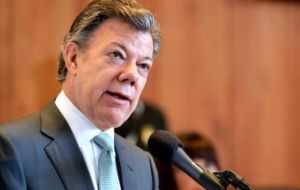MercoPress. South Atlantic News Agency
Unilateral FARC truce allegedly in force
 Colombian President Juan Manuel Santos wants to end the war with FARC
Colombian President Juan Manuel Santos wants to end the war with FARC Colombia's armed forces suffer 10 fatal casualties, several others wounded and one missing in clashes with rebels. Negotiations continue unaltered in Havana.
Five Colombian army soldiers were killed, seven other were wounded and one more was reported missing in the early hours of Friday in a rural area of Santander de Quilichao, north of Cauca, as the result of an attack by the FARC guerrillas. The rebels also blew up a section of the Via Panamericana Popayan-Cali route, which was partially destroyed, although circulation could be restored shortly. Other five Colombian servicement were also killed in other engagements with FARC Friday.
Colombian President Juan Manuel Santos expressed his condolences the family of the fallen combatants, whom he dubbed “national heroes,” but added that “on the other hand we now have 31 members of the guerrilla, who have been neutralized, 15 of whom have been shot dead, also in combat.”
Speaking about the peace talks between government officials and FARC leaders currently underway in Havana, Santos said “this is the war that I want to finish.”
With regard to the unilateral, indefinite ceasefire by FARC which was to begin at 0:00 on Saturday, the Santos government announced it will monitor the truce and asked for more gestures of peace.
Opposition political groups have labeled the truce a “trap so that the guerrillas can regroup and seek reinforcements by requiring the reduction of military operations.” For this reason the Bogota government had rejected the offer Thursday, on the grounds that the conditions are unacceptable until a peace deal is reached and that only then would discussion on international oversight of the truce be admissible.
FARC has declared temporary ceasefires during the past two Christmases and it halted combat operations during this year’s elections, but has not called an indefinite ceasefire since the current talks began.
The two sides have reached agreements on agrarian reform, political participation for the FARC and how to jointly combat illegal drugs. But some of the thorniest issues remain unresolved, including how the FARC would lay down its arms and whether commanders would face prosecution for atrocities and drug trafficking.
Thousands of Colombians marched over the weekend in major cities to reject any amnesty that would allow rebel leaders to escape justice.
Also on Friday, Panamanian authorities broke up a drug trafficking organisation linked to FARC and to the Mexican drug cartel of Sinaloa, arrested 59 of its members and more than three tons of cocaine were seized. Panama 's drug prosecutor Javier Caraballo, said Friday that the group was also found to have 13 bank accounts through which it moved the drug money.
“This group used our country as a platform for international drug trafficking and deposited the proceeds of this crime in different Panamanian banks,” Caraballo said in a press conference. He also said the network leader was Colombian national Martín Pérez Castro, a.k.a. “Richard,” believed to be the head of FARC's Front 30 wing.
Caraballo said that Colombia, Costa Rica, Guatemala and Mexico took part in the intelligence operation that led to the arrests.




Top Comments
Disclaimer & comment rulesCommenting for this story is now closed.
If you have a Facebook account, become a fan and comment on our Facebook Page!